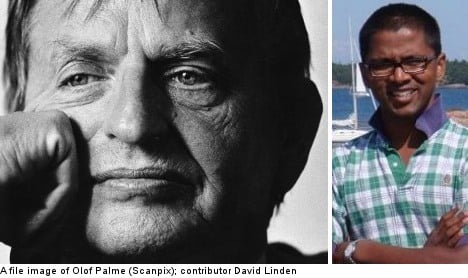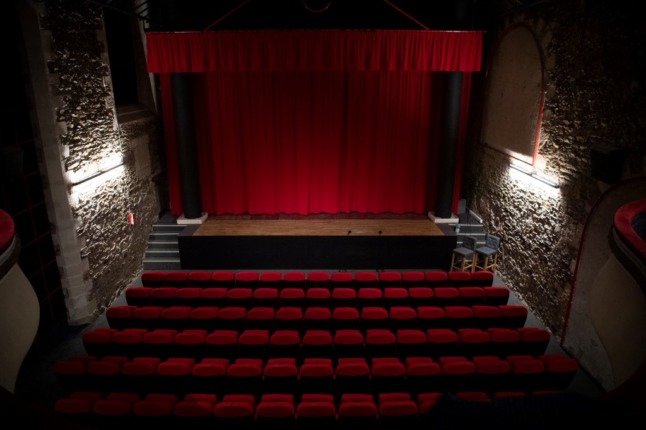More than two decades after his death, the life and career of Olof Palme (1927-1986) haunt and intrigue Sweden’s national psyche.
He was Social Democratic Prime Minister between 1969-1976, and from 1982 until he was shot dead in 1986. The fact that his murder is still unsolved helped create a legend that has made Palme a secular Swedish saint.
He is the closest thing Sweden has ever had to a US president. A telling detail is that one still needs permission from the Palme family to access his papers.
Olof Palme is intriguing in many ways and not just because of his tragic death.
His public career lasted for almost four decades and he was a politician that could stir up emotions. According to former Social Democrat party leader Mona Sahlin, when she joined the party she did not become just a member of the Social Democrats, she “joined Olof Palme”.
On the other hand Ulf Adelsohn, who was leader of the rival Moderate Party from 1981-1986, has said of Palme that “no-one could make me so angry”.
This divisive mode is captured in the title of the new documentary chronicling his life: “Olof Palme: alskad och hatad” (‘Olof Palme: loved and hated’).
Olof Palme was a feared opponent and a formidable friend. He is famous for his aggressive and arrogant oratory. It is said that when he lost the 1976 election it was as a result of debating with the leader of the agrarian Centre Party, Thorbjörn Fälldin, who succeeded him as Prime Minister.
Fälldin was the opposite of Palme and he realized that he could not keep up with his opponent’s rhetorical skills. His strategy was instead to make Palme angry and frustrated by speaking slowly and appearing clumsy.
It worked.
The debate was held in the Scandinavium sports stadium in Gothenburg and those who attended the debate live voted for Palme, while those that saw it on TV and heard it on radio opted for Fälldin.
On TV, Palme often appeared aggressive and condescending, while those who heard him live found the experience unforgettable.
He was not a normal Swedish politician since, despite having aristocratic roots and being educated in the US, he chose to become a Social Democrat.
And this is also where the key to understanding Palme lies: in many ways, he was more an American than a Swedish politician.
The journey began at Kenyon College in Ohio in the Midwestern United States. It is a small private liberal arts college founded in 1824. Among its alumni are Rutherford B. Hayes, US president from 1877-1881 and Swedish descendent William Rehnquist, Chief Justice of the Supreme Court from 1986-2005.
In 1947, Palme arrived at Kenyon to study for a Bachelor of Arts Degree and completed the course in less than a year. Most importantly, he took an English course entitled “speech” that was to change his life.
After he finished his degree he travelled through a segregated United States by bus; he would recall his American experience later in speeches and interviews. This experience created the Anglo-Saxon politician Olof Palme.
It also made him a modern progressive man to the extent that the British talk show host David Frost interviewed him when he was about to become Prime Minister in 1969, making him the only Swedish politician besides Carl Bildt to interviewed by Frost.
When Palme became Prime Minister he maintained his connection to the Anglo-American world. In his archive, there are letters from the historian and John F. Kennedy adviser Arthur M. Schlesinger Jr. and the economist John Kenneth Galbraith, among others.
Despite a speech in which Palme likened the 1972 Christmas US bombings of Hanoi to atrocities committed under the Nazis – a speech that led to the expulsion of the Swedish ambassador from Washington – US statesman Henry Kissinger nevertheless said that there were only two Swedes you could talk to: Olof Palme and Pehr G. Gyllenhammar.
The latter was the long-serving CEO of Volvo, and together, he and Palme represented politics and capital. They became the symbol of what was called “the Swedish model”. It’s no coincidence that they both had spent a long time in the US: Palme as a student and Gyllenhammar working for a New York law firm.
If Kenyon College made Palme, Harvard University nearly destroyed him at the end of his career. In 1985, he won re-election as Prime Minister and was invited to deliver a lecture at Harvard. But instead of accepting payment for the lecture it was arranged that one of his sons could attend there for a term without paying any fees.
This clear case of nepotism caught the eyes of the Swedish media, as Palme forgot to include the arrangement in his official tax return. The non-fee agreement was a form of payment, and should therefore have been taken into account when declaring income.
The conservative opposition used the fact that not even the Prime Minister understood the Swedish tax structure as proof of an overregulated nanny state. It was also an attack on Palme personally since he previously had not minced words when attacking his opponents.
He was in many ways the master of insults. For example, when leader of the Folkpartiet (Liberal Party) Bengt Westerberg in 1985 tried to become leader of the opposition, Palme compared him to former US president Richard Nixon’s chief of staff General Alexander Haig: the man who during the Watergate scandal which eventually toppled Nixon declared: “I am in charge”.
Ironically, the same Anglo-Saxon world that so shaped Palme as a politician also spawned the powerful weapon of free market neoliberal ideas which became Palme’s most formidable foe.
In the 1970s he saw the threat of what he called “the crazy monetarists” and called Margaret Thatcher “a true extremist”. But by the 1980s, the international trends in economic thinking armed the opposition with weapons to fight Palme.
It is also one of the reasons that the second part of history professor Kjell Östberg’s biography of Palme has the subtitle: “when the tide turned.” Palme lived to see the shift and might, had he lived, have lost the 1988 election.
In conclusion, one could say that, at least for a couple of years, Sweden had its own Kennedy-esque Camelot. But while John F. Kennedy did not live long enough to be unmasked, Palme did.
Today, his legacy is viewed with ambivalence, which is a shame. He is perceived as either a hero or a villain, although I would argue that he was both.
What makes him unique is that he was, and so far remains, Sweden’s most international Prime Minister, and the only one who was educated outside of Sweden.
David Lindén is a PhD student in history at King’s College London and served as acting political editor for Länstidningen in Södertälje for the summer 2012. Follow him on Twitter at @davidlinden1.



 Please whitelist us to continue reading.
Please whitelist us to continue reading.
Member comments